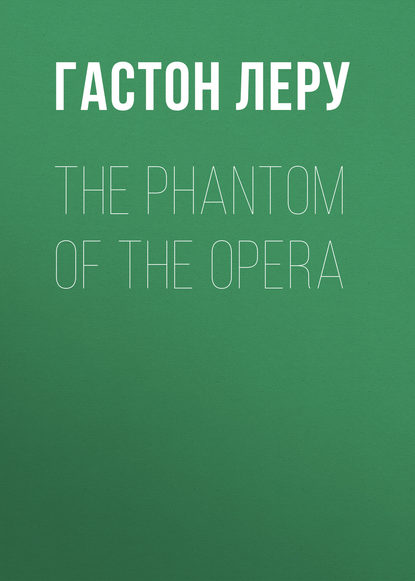По всем вопросам обращайтесь на: info@litportal.ru
(©) 2003-2024.
✖
The Phantom of the Opera
Автор
Год написания книги
2018
Настройки чтения
Размер шрифта
Высота строк
Поля
"Put them outside the wall," he said. "We shall find them there when we leave."[7 - These two pairs of boots, which were placed, according to the Persian's papers, just between the set piece and the scene from the ROI DE LAHORE, on the spot where Joseph Buquet was found hanging, were never discovered. They must have been taken by some stage-carpenter or "door-shutter."]
He crawled a little farther on his knees, then turned right round and said:
"I am going to hang by my hands from the edge of the stone and let myself drop INTO HIS HOUSE. You must do exactly the same. Do not be afraid. I will catch you in my arms."
Raoul soon heard a dull sound, evidently produced by the fall of the Persian, and then dropped down.
He felt himself clasped in the Persian's arms.
"Hush!" said the Persian.
And they stood motionless, listening.
The darkness was thick around them, the silence heavy and terrible.
Then the Persian began to make play with the dark lantern again, turning the rays over their heads, looking for the hole through which they had come, and failing to find it:
"Oh!" he said. "The stone has closed of itself!"
And the light of the lantern swept down the wall and over the floor.
The Persian stooped and picked up something, a sort of cord, which he examined for a second and flung away with horror.
"The Punjab lasso!" he muttered.
"What is it?" asked Raoul.
The Persian shivered. "It might very well be the rope by which the man was hanged, and which was looked for so long."
And, suddenly seized with fresh anxiety, he moved the little red disk of his lantern over the walls. In this way, he lit up a curious thing: the trunk of a tree, which seemed still quite alive, with its leaves; and the branches of that tree ran right up the walls and disappeared in the ceiling.
Because of the smallness of the luminous disk, it was difficult at first to make out the appearance of things: they saw a corner of a branch … and a leaf … and another leaf … and, next to it, nothing at all, nothing but the ray of light that seemed to reflect itself … Raoul passed his hand over that nothing, over that reflection.
"Hullo!" he said. "The wall is a looking-glass!"
"Yes, a looking-glass!" said the Persian, in a tone of deep emotion. And, passing the hand that held the pistol over his moist forehead, he added, "We have dropped into the torture-chamber!"
What the Persian knew of this torture-chamber and what there befell him and his companion shall be told in his own words, as set down in a manuscript which he left behind him, and which I copy VERBATIM.
Chapter XXI Interesting and Instructive Vicissitudesof a Persian in the Cellars of the Opera
THE PERSIAN'S NARRATIVE
It was the first time that I entered the house on the lake. I had often begged the "trap-door lover," as we used to call Erik in my country, to open its mysterious doors to me. He always refused. I made very many attempts, but in vain, to obtain admittance. Watch him as I might, after I first learned that he had taken up his permanent abode at the Opera, the darkness was always too thick to enable me to see how he worked the door in the wall on the lake. One day, when I thought myself alone, I stepped into the boat and rowed toward that part of the wall through which I had seen Erik disappear. It was then that I came into contact with the siren who guarded the approach and whose charm was very nearly fatal to me.
I had no sooner put off from the bank than the silence amid which I floated on the water was disturbed by a sort of whispered singing that hovered all around me. It was half breath, half music; it rose softly from the waters of the lake; and I was surrounded by it through I knew not what artifice. It followed me, moved with me and was so soft that it did not alarm me. On the contrary, in my longing to approach the source of that sweet and enticing harmony, I leaned out of my little boat over the water, for there was no doubt in my mind that the singing came from the water itself. By this time, I was alone in the boat in the middle of the lake; the voice—for it was now distinctly a voice—was beside me, on the water. I leaned over, leaned still farther. The lake was perfectly calm, and a moonbeam that passed through the air hole in the Rue Scribe showed me absolutely nothing on its surface, which was smooth and black as ink. I shook my ears to get rid of a possible humming; but I soon had to accept the fact that there was no humming in the ears so harmonious as the singing whisper that followed and now attracted me.
Had I been inclined to superstition, I should have certainly thought that I had to do with some siren whose business it was to confound the traveler who should venture on the waters of the house on the lake. Fortunately, I come from a country where we are too fond of fantastic things not to know them through and through; and I had no doubt but that I was face to face with some new invention of Erik's. But this invention was so perfect that, as I leaned out of the boat, I was impelled less by a desire to discover its trick than to enjoy its charm; and I leaned out, leaned out until I almost overturned the boat.
Suddenly, two monstrous arms issued from the bosom of the waters and seized me by the neck, dragging me down to the depths with irresistible force. I should certainly have been lost, if I had not had time to give a cry by which Erik knew me. For it was he; and, instead of drowning me, as was certainly his first intention, he swam with me and laid me gently on the bank:
"How imprudent you are!" he said, as he stood before me, dripping with water. "Why try to enter my house? I never invited you! I don't want you there, nor anybody! Did you save my life only to make it unbearable to me? However great the service you rendered him, Erik may end by forgetting it; and you know that nothing can restrain Erik, not even Erik himself."
He spoke, but I had now no other wish than to know what I already called the trick of the siren. He satisfied my curiosity, for Erik, who is a real monster—I have seen him at work in Persia, alas—is also, in certain respects, a regular child, vain and self-conceited, and there is nothing he loves so much, after astonishing people, as to prove all the really miraculous ingenuity of his mind.
He laughed and showed me a long reed.
"It's the silliest trick you ever saw," he said, "but it's very useful for breathing and singing in the water. I learned it from the Tonkin pirates, who are able to remain hidden for hours in the beds of the rivers."[8 - An official report from Tonkin, received in Paris at the end of July, 1909, relates how the famous pirate chief De Tham was tracked, together with his men, by our soldiers; and how all of them succeeded in escaping, thanks to this trick of the reeds.]
I spoke to him severely.
"It's a trick that nearly killed me!" I said. "And it may have been fatal to others! You know what you promised me, Erik? No more murders!"
"Have I really committed murders?" he asked, putting on his most amiable air.
"Wretched man!" I cried. "Have you forgotten the rosy hours of Mazenderan?"
"Yes," he replied, in a sadder tone, "I prefer to forget them. I used to make the little sultana laugh, though!"
"All that belongs to the past," I declared; "but there is the present … and you are responsible to me for the present, because, if I had wished, there would have been none at all for you. Remember that, Erik: I saved your life!"
And I took advantage of the turn of conversation to speak to him of something that had long been on my mind:
"Erik," I asked, "Erik, swear that …"
"What?" he retorted. "You know I never keep my oaths. Oaths are made to catch gulls with."
"Tell me … you can tell me, at any rate…"
"Well?"
"Well, the chandelier … the chandelier, Erik? …"
"What about the chandelier?"
"You know what I mean."
"Oh," he sniggered, "I don't mind telling you about the chandelier! … IT WASN'T I! … The chandelier was very old and worn."
When Erik laughed, he was more terrible than ever. He jumped into the boat, chuckling so horribly that I could not help trembling.
"Very old and worn, my dear daroga![9 - DAROGA is Persian for chief of police.] Very old and worn, the chandelier! … It fell of itself! … It came down with a smash! … And now, daroga, take my advice and go and dry yourself, or you'll catch a cold in the head! … And never get into my boat again … And, whatever you do, don't try to enter my house: I'm not always there … daroga! And I should be sorry to have to dedicate my Requiem Mass to you!"
So saying, swinging to and fro, like a monkey, and still chuckling, he pushed off and soon disappeared in the darkness of the lake.
From that day, I gave up all thought of penetrating into his house by the lake. That entrance was obviously too well guarded, especially since he had learned that I knew about it. But I felt that there must be another entrance, for I had often seen Erik disappear in the third cellar, when I was watching him, though I could not imagine how.
Ever since I had discovered Erik installed in the Opera, I lived in a perpetual terror of his horrible fancies, not in so far as I was concerned, but I dreaded everything for others.[10 - The Persian might easily have admitted that Erik's fate also interested himself, for he was well aware that, if the government of Teheran had learned that Erik was still alive, it would have been all up with the modest pension of the erstwhile daroga. It is only fair, however, to add that the Persian had a noble and generous heart; and I do not doubt for a moment that the catastrophes which he feared for others greatly occupied his mind. His conduct, throughout this business, proves it and is above all praise.]
He crawled a little farther on his knees, then turned right round and said:
"I am going to hang by my hands from the edge of the stone and let myself drop INTO HIS HOUSE. You must do exactly the same. Do not be afraid. I will catch you in my arms."
Raoul soon heard a dull sound, evidently produced by the fall of the Persian, and then dropped down.
He felt himself clasped in the Persian's arms.
"Hush!" said the Persian.
And they stood motionless, listening.
The darkness was thick around them, the silence heavy and terrible.
Then the Persian began to make play with the dark lantern again, turning the rays over their heads, looking for the hole through which they had come, and failing to find it:
"Oh!" he said. "The stone has closed of itself!"
And the light of the lantern swept down the wall and over the floor.
The Persian stooped and picked up something, a sort of cord, which he examined for a second and flung away with horror.
"The Punjab lasso!" he muttered.
"What is it?" asked Raoul.
The Persian shivered. "It might very well be the rope by which the man was hanged, and which was looked for so long."
And, suddenly seized with fresh anxiety, he moved the little red disk of his lantern over the walls. In this way, he lit up a curious thing: the trunk of a tree, which seemed still quite alive, with its leaves; and the branches of that tree ran right up the walls and disappeared in the ceiling.
Because of the smallness of the luminous disk, it was difficult at first to make out the appearance of things: they saw a corner of a branch … and a leaf … and another leaf … and, next to it, nothing at all, nothing but the ray of light that seemed to reflect itself … Raoul passed his hand over that nothing, over that reflection.
"Hullo!" he said. "The wall is a looking-glass!"
"Yes, a looking-glass!" said the Persian, in a tone of deep emotion. And, passing the hand that held the pistol over his moist forehead, he added, "We have dropped into the torture-chamber!"
What the Persian knew of this torture-chamber and what there befell him and his companion shall be told in his own words, as set down in a manuscript which he left behind him, and which I copy VERBATIM.
Chapter XXI Interesting and Instructive Vicissitudesof a Persian in the Cellars of the Opera
THE PERSIAN'S NARRATIVE
It was the first time that I entered the house on the lake. I had often begged the "trap-door lover," as we used to call Erik in my country, to open its mysterious doors to me. He always refused. I made very many attempts, but in vain, to obtain admittance. Watch him as I might, after I first learned that he had taken up his permanent abode at the Opera, the darkness was always too thick to enable me to see how he worked the door in the wall on the lake. One day, when I thought myself alone, I stepped into the boat and rowed toward that part of the wall through which I had seen Erik disappear. It was then that I came into contact with the siren who guarded the approach and whose charm was very nearly fatal to me.
I had no sooner put off from the bank than the silence amid which I floated on the water was disturbed by a sort of whispered singing that hovered all around me. It was half breath, half music; it rose softly from the waters of the lake; and I was surrounded by it through I knew not what artifice. It followed me, moved with me and was so soft that it did not alarm me. On the contrary, in my longing to approach the source of that sweet and enticing harmony, I leaned out of my little boat over the water, for there was no doubt in my mind that the singing came from the water itself. By this time, I was alone in the boat in the middle of the lake; the voice—for it was now distinctly a voice—was beside me, on the water. I leaned over, leaned still farther. The lake was perfectly calm, and a moonbeam that passed through the air hole in the Rue Scribe showed me absolutely nothing on its surface, which was smooth and black as ink. I shook my ears to get rid of a possible humming; but I soon had to accept the fact that there was no humming in the ears so harmonious as the singing whisper that followed and now attracted me.
Had I been inclined to superstition, I should have certainly thought that I had to do with some siren whose business it was to confound the traveler who should venture on the waters of the house on the lake. Fortunately, I come from a country where we are too fond of fantastic things not to know them through and through; and I had no doubt but that I was face to face with some new invention of Erik's. But this invention was so perfect that, as I leaned out of the boat, I was impelled less by a desire to discover its trick than to enjoy its charm; and I leaned out, leaned out until I almost overturned the boat.
Suddenly, two monstrous arms issued from the bosom of the waters and seized me by the neck, dragging me down to the depths with irresistible force. I should certainly have been lost, if I had not had time to give a cry by which Erik knew me. For it was he; and, instead of drowning me, as was certainly his first intention, he swam with me and laid me gently on the bank:
"How imprudent you are!" he said, as he stood before me, dripping with water. "Why try to enter my house? I never invited you! I don't want you there, nor anybody! Did you save my life only to make it unbearable to me? However great the service you rendered him, Erik may end by forgetting it; and you know that nothing can restrain Erik, not even Erik himself."
He spoke, but I had now no other wish than to know what I already called the trick of the siren. He satisfied my curiosity, for Erik, who is a real monster—I have seen him at work in Persia, alas—is also, in certain respects, a regular child, vain and self-conceited, and there is nothing he loves so much, after astonishing people, as to prove all the really miraculous ingenuity of his mind.
He laughed and showed me a long reed.
"It's the silliest trick you ever saw," he said, "but it's very useful for breathing and singing in the water. I learned it from the Tonkin pirates, who are able to remain hidden for hours in the beds of the rivers."[8 - An official report from Tonkin, received in Paris at the end of July, 1909, relates how the famous pirate chief De Tham was tracked, together with his men, by our soldiers; and how all of them succeeded in escaping, thanks to this trick of the reeds.]
I spoke to him severely.
"It's a trick that nearly killed me!" I said. "And it may have been fatal to others! You know what you promised me, Erik? No more murders!"
"Have I really committed murders?" he asked, putting on his most amiable air.
"Wretched man!" I cried. "Have you forgotten the rosy hours of Mazenderan?"
"Yes," he replied, in a sadder tone, "I prefer to forget them. I used to make the little sultana laugh, though!"
"All that belongs to the past," I declared; "but there is the present … and you are responsible to me for the present, because, if I had wished, there would have been none at all for you. Remember that, Erik: I saved your life!"
And I took advantage of the turn of conversation to speak to him of something that had long been on my mind:
"Erik," I asked, "Erik, swear that …"
"What?" he retorted. "You know I never keep my oaths. Oaths are made to catch gulls with."
"Tell me … you can tell me, at any rate…"
"Well?"
"Well, the chandelier … the chandelier, Erik? …"
"What about the chandelier?"
"You know what I mean."
"Oh," he sniggered, "I don't mind telling you about the chandelier! … IT WASN'T I! … The chandelier was very old and worn."
When Erik laughed, he was more terrible than ever. He jumped into the boat, chuckling so horribly that I could not help trembling.
"Very old and worn, my dear daroga![9 - DAROGA is Persian for chief of police.] Very old and worn, the chandelier! … It fell of itself! … It came down with a smash! … And now, daroga, take my advice and go and dry yourself, or you'll catch a cold in the head! … And never get into my boat again … And, whatever you do, don't try to enter my house: I'm not always there … daroga! And I should be sorry to have to dedicate my Requiem Mass to you!"
So saying, swinging to and fro, like a monkey, and still chuckling, he pushed off and soon disappeared in the darkness of the lake.
From that day, I gave up all thought of penetrating into his house by the lake. That entrance was obviously too well guarded, especially since he had learned that I knew about it. But I felt that there must be another entrance, for I had often seen Erik disappear in the third cellar, when I was watching him, though I could not imagine how.
Ever since I had discovered Erik installed in the Opera, I lived in a perpetual terror of his horrible fancies, not in so far as I was concerned, but I dreaded everything for others.[10 - The Persian might easily have admitted that Erik's fate also interested himself, for he was well aware that, if the government of Teheran had learned that Erik was still alive, it would have been all up with the modest pension of the erstwhile daroga. It is only fair, however, to add that the Persian had a noble and generous heart; and I do not doubt for a moment that the catastrophes which he feared for others greatly occupied his mind. His conduct, throughout this business, proves it and is above all praise.]

















